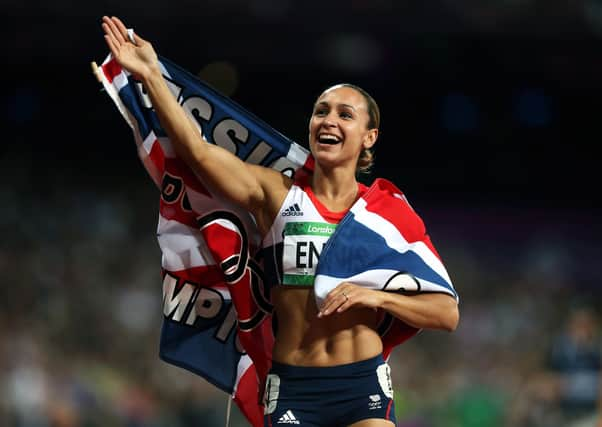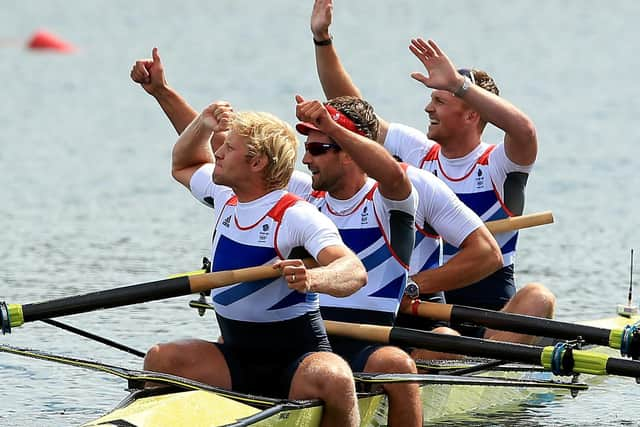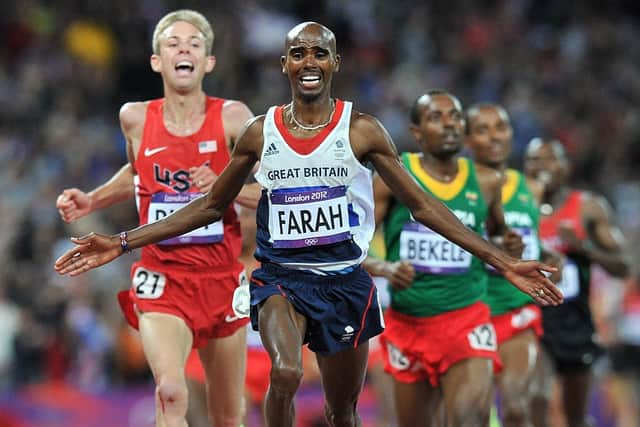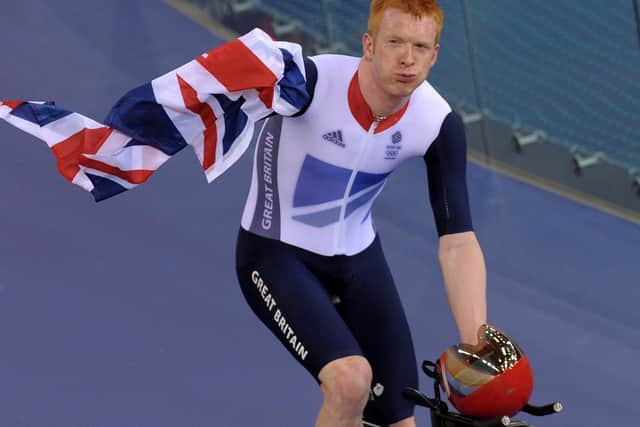How Yorkshire’s athletes helped elevate London 2012


In the same spirit in which the adage that ‘nothing can prepare you for the birth of a first child’ is meant, so the saying rings true for an Olympic Games.
No matter how much preparation you do, no matter how rigidly you map out your daily whereabouts and the events and stories you will cover, no level of planning can quite live up to the sheer scale of what is about to hit you.
Advertisement
Hide AdAdvertisement
Hide AdLike an uncontrollable, screaming baby that has you up half the night, the Olympics takes hold of your senses and dominates your life, dictating your every emotion.


That was certainly the case for me during the one and only Olympics I covered for The Yorkshire Post, the 2012 Summer Games in London.
I had planned our coverage for weeks, going off diary to write back-stories and profiles on each and every one of the 54 athletes linked to Yorkshire; from those woven into the very fabric of the county like Alistair Brownlee, to those who once stopped off at Hartshead Moor Services on the M62. Steven Larsson, a Scarborough-born handball player who lived in Sweden, was about as obscure as it got (and I still found time to watch him in action), unless you count Usain Bolt, who was frequently spotted with a burger in his hands at Hartshead Moor around that time.
But all that planning, crucial as it was as it gave me a structure to each of the 17 days of the Games’ lifetime, was about to be thrown up in the air.
Advertisement
Hide AdAdvertisement
Hide AdBecause once on site, as the realisation dawns at the sheer scale of the Olympics, everything changes in an instant.


It is very much a rollercoaster, and once the first car drops down the opening ramp you lose control of everything.
Archery at Lord’s one minute, the opening ceremony in the stadium the next. The Mall to witness Mark Cavendish come up short in the men’s road race, and then back there 24 hours later to see Lizzie Armitstead win a silver, throwing best-laid-plans into the air and the hunt beginning for Armitstead’s grandpartents to add colour to the reports.
In the Queen Elizabeth Olympic Park for the hockey one night, and then through the crowds to get to the velodrome the next.
Advertisement
Hide AdAdvertisement
Hide AdThe Aquatics Centre to watch Tom Daley agonisingly miss out on a medal one day, then back there the following evening to bear witness to sporting immortality, Michael Phelps winning a record 19th Olympic medal.


That was the race in which South Africa’s Chad Le Clos beat him in the butterfly final and his father gave one of the more emotional interviews of the Games to Claire Balding on the BBC. Everyone was talking about it, except for me, because by then I was completely immersed in the bubble.
I was already planning the next day, a morning at Eton Dorney for the first of the rowing finals, followed by an afternoon in the media centre writing previews for the track cycling and athletics that were due to get started in the next 48 hours.
I actually hit the wall that day. The adrenalin had been coursing through my veins for the first five days, culminating in seeing Phelps make history, and I crashed and burned on day six. My gilded list of 54 athletes was missing a weightlifter who studied at Leeds University and my sports editor, Matt Reeder, hit the roof. It was the catalyst for a bad day, but he was right, and what he and I were both learning on the job was that you cannot be everywhere, you cannot cover every gold medal, every failure; you can only be in one place, and cooler heads prevailed as he steered me back round later that day.
Advertisement
Hide AdAdvertisement
Hide AdAnother steadying call from the experienced gaffer was required the following week, and if there is one piece of advice I would pass on to any first time Olympics reporter, it is to pace yourself. It is easy to get caught up in the euphoria at first, to be swept along on the wave of emotion, but try and detach yourself, don’t let the adrenalin overwhelm you.
I was back on an even keel on day seven, the start of Britain’s dominance of the track cycling, and by the time of Super Saturday, back in a rhythm.
Jessica Ennis, Greg Rutherford and Mo Farah intoxicated the Olympic Stadium in a spellbinding 45-minute spell that will probably never be topped. I was there, trying to be as professional as I could be, just as I was at Eton Dorney that morning to see two golds in the rowing, one for the men’s four led by Andrew Triggs Hodge, who walked through the mixed zone after the race, spotted me and gave me a big bear hug. “Bringing it home for Yorkshire,” he roared.
He wasn’t the only one.
London 2012 was the Olympics of Yorkshire. Athletes representing this great county won seven gold medals, two silvers and three bronze medals. You may have heard, but that was more than Canada and Australia.
Advertisement
Hide AdAdvertisement
Hide AdAs the Games reached a second week, the medals for God’s Own County were coming in thick and fast; a Brownlee double in the triathlon, Nicola Adams’ trailblazing feats in the boxing ring, Ed Clancy for a second time on the track, and Luke Campbell on the penultimate night. Yorkshire’s success was becoming a story in itself, and I as the Post’s man on the ground was in demand. AFP, Reuters, Radio 4s Today programme and even a radio station Down Under all sought my opinion, demanding to know what the secret was.
Bloody hard work, was often my reply. On the only morning I had scheduled myself to be off, Richard Caborn, the former sports minister, rang me at 7.30am to say: “What are we gonna do about all this Yorkshire success? I think we should have the parade in Wakefield’.
I had no answer, but I had to write the story.
They were long days on the Olympic beat, long but rewarding. The day would begin at around 7am, quick breakfast in the university digs I was bivouaced in, straight to the media shuttle to take you to your first venue, then away you went.
Most nights if you made it back to the Media Centre – a vast aircraft hanger full of reporters from all countries filing copy at all hours – you headed for the media bar for what a few of the regional hacks and I would call an ‘unwinder’ or two. Friendships for life were forged in those moments.
Advertisement
Hide AdAdvertisement
Hide AdThere are sights and sounds that stay with you. The noise made by rival Argentinian and Lithuanian basketball fans was enchanting.
The ‘ole’s’ of the Irish fans on the concourse of the ExCel after boxer Katie Taylor had won gold, brought a lump to the throat.
The quiet moments, rare that they were, when you could sit in a press tribune at any sport, take in a bit of the action and write your reports up, were cherished.
There are regrets; I missed the GB gymnastics team win gold and Andy Murray’s major breakthrough; but they are far outweighed by so many fond memories.
Advertisement
Hide AdAdvertisement
Hide AdIt felt like London 2012 lifted an entire nation. How dearly we could all do with something like that right now. To be on the ground helping tell the story, is the highlight of my career, and will never be topped.
I remember the train journey back up north, leaving London behind me with only the closing ceremony left to unfold. I filed my final piece as the train pulled out of Peterborough, before I allowed myself an hour to reflect on the past 17 days.
Exhausted, drained, emotional and exhilerated.
Best of the rest ...some other highlights
While the Olympics takes some beating, the Super Bowl ran it close.
This February I realised a lifetime ambition, and took myself off to America to cover Super Bowl LIV in Miami. Well, it was 40th birthday.
Advertisement
Hide AdAdvertisement
Hide AdThat produced the same buzz as the Olympics, only it was just one day compared to 17 of the Games.
The 2010 Ryder Cup is up there. Extended into four days because of the weather, never has a wet weekend in Wales been so thrilling. Again it was an event that took hold of the senses.
Closer to home, Bradford City’s defeat of Aston Villa in the League Cup semi-final first leg, bridging a gap of three divisions, was a special night to witness.
I saw some cracking games from the conservatory at Clifton Lane, the home of Rotherham Titans, not least their 44-6 evisceration of Bristol.
Advertisement
Hide AdAdvertisement
Hide AdAnd the first football game I covered for The Yorkshire Post involved the then-editor’s beloved Sheffield United, three late goals and a sending off.
“Your lad did a good job,” he told the sports editor.
“Just tell him United played four at the back, not five.”
I’ve never been one for accuracy.
Editor’s note: first and foremost - and rarely have I written down these words with more sincerity - I hope this finds you well.
Almost certainly you are here because you value the quality and the integrity of the journalism produced by The Yorkshire Post’s journalists - almost all of which live alongside you in Yorkshire, spending the wages they earn with Yorkshire businesses - who last year took this title to the industry watchdog’s Most Trusted Newspaper in Britain accolade.
And that is why I must make an urgent request of you: as advertising revenue declines, your support becomes evermore crucial to the maintenance of the journalistic standards expected of The Yorkshire Post. If you can, safely, please buy a paper or take up a subscription. We want to continue to make you proud of Yorkshire’s National Newspaper but we are going to need your help.
Advertisement
Hide AdAdvertisement
Hide AdPostal subscription copies can be ordered by calling 0330 4030066 or by emailing [email protected]. Vouchers, to be exchanged at retail sales outlets - our newsagents need you, too - can be subscribed to by contacting subscriptions on 0330 1235950 or by visiting www.localsubsplus.co.uk where you should select The Yorkshire Post from the list of titles available.
If you want to help right now, download our tablet app from the App / Play Stores. Every contribution you make helps to provide this county with the best regional journalism in the country.
Sincerely. Thank you.
James Mitchinson
Editor
Comment Guidelines
National World encourages reader discussion on our stories. User feedback, insights and back-and-forth exchanges add a rich layer of context to reporting. Please review our Community Guidelines before commenting.